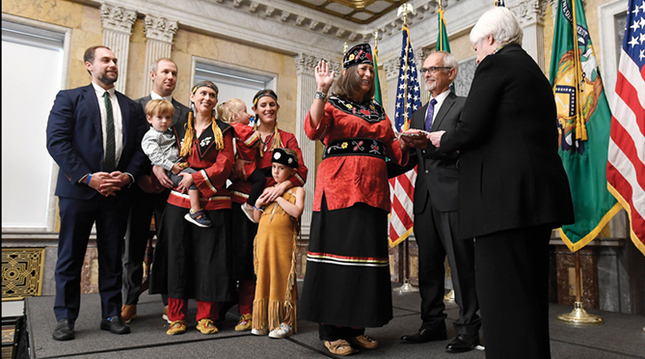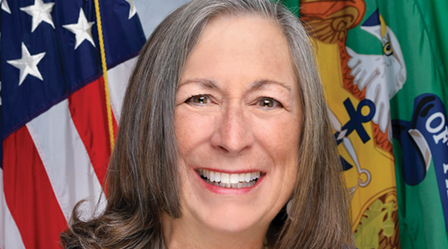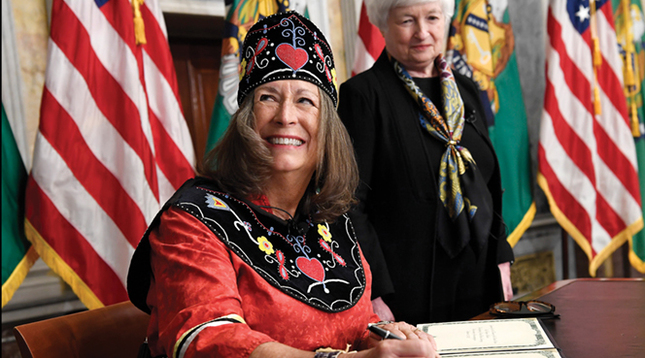
US Treasury
Secretary of the Treasury Janet Yellen ’71PhD swears in Mohegan Chief Lynn Malerba ’15DNP as Treasurer of the United States on September 12, 2022.
View full image

US Treasury
Secretary of the Treasury Janet Yellen ’71PhD swears in Mohegan Chief Lynn Malerba ’15DNP as Treasurer of the United States on September 12, 2022.
View full image

US Treasury
The Mohegan tribal historian, Melissa Tantaquidgeon Zobel, says that Malerba (above) “really, truly, deeply cares for people at a level that is hard for many of us to reach.”
View full image

US Treasury
The Mohegan tribal historian, Melissa Tantaquidgeon Zobel, says that Malerba (above) “really, truly, deeply cares for people at a level that is hard for many of us to reach.”
View full image

US Treasury
As treasurer of the United States, Malerba oversees the US Mint, the Bureau of Engraving and Printing, and Fort Knox, and she works as an adviser to Janet Yellen, secretary of the treasury (at right). US currency now bears both their signatures.
View full image

US Treasury
As treasurer of the United States, Malerba oversees the US Mint, the Bureau of Engraving and Printing, and Fort Knox, and she works as an adviser to Janet Yellen, secretary of the treasury (at right). US currency now bears both their signatures.
View full image
In 2010, Marilynn Malerba ’15DNP received the job offer of a lifetime—literally.
A member of the Mohegan tribe in southeastern Connecticut, Malerba, who goes by Lynn, had been involved in tribal government for over a decade, serving as the executive director of health and human services and chairing the Tribal Council. But the Council of Elders wanted to appoint her as the next chief of the tribe. If she accepted, she would serve in this role for the rest of her life.
“I was very torn,” Malerba recalls. “It was an existential crisis.” She consulted her trusted advisers: her husband, her children, and her parents. Malerba’s mother, Loretta Roberge, who had herself been a tribal leader, unequivocally encouraged her daughter to say yes. Serving her community in this role, Roberge said, would be the highest honor—along with the honor of being the first female chief in the tribe’s modern history.
Malerba’s mother’s words have continued to guide her more than a decade later, as she embarks on a new phase of her career as a public servant. On September 12, 2022, Chief Malerba was sworn in as the Treasurer of the United States. The groundbreaking appointment makes her the first Indigenous person to oversee the production and circulation of the money of the United States.
But “it’s not just about being a tribal and Indigenous person at this level” in the Treasury, she says. The path that brought her to her new office in Washington had started in childhood, when she was a “poor girl from Uncasville, Connecticut.” It took her through a lengthy career as a critical-care nurse working with the hospital’s sickest patients. It returned her to the classroom later in life as a student in the doctor of nursing practice program at the Yale School of Nursing.
Reminiscing on this journey just days after moving to Washington and starting her new job, she reflected on the impact she has had on her patients and tribal communities. “I hope that I’ll continue to have a great impact—just at a different level,” Malerba says.
Malerba’s life had been intertwined with tribal life from an early age. She grew up in a part of Uncasville known as Mohegan Hill, near the Tantaquidgeon Museum, which holds artifacts that celebrate more than 300 years of the tribe’s history on southeastern Connecticut lands. Malerba’s great-grandfather was chief of the Mohegans in the early 1900s, and Malerba’s mother was on the tribal council decades later, successfully fighting for federal recognition of the tribe. Public service was a family affair—and a reminder of the ongoing fight to reclaim all that nonindigenous Americans had taken from Indigenous people. Malerba and her six siblings often volunteered to clean the Mohegan burial grounds, sacred lands that had been seized by the state and turned into a state park.
Lynn “really, truly, deeply cares for people at a level that is hard for many of us to reach,” says Melissa Tantaquidgeon Zobel, tribal historian and a former Mohegan medicine woman who has known Malerba’s family since childhood. Malerba’s mother was the same, Zobel notes. “There’s never a sense that it’s political or it’s superficial.”
As she reached the end of high school, Malerba started looking for a vocation that allowed her to keep serving others. Nursing was the perfect fit, but money was tight. “I knew I had to be creative about how I was going to go to school,” she says. She decided to study nursing in a three-year program at the Hartford Hospital School of Nursing, where she would be able to take advantage of federal scholarships and work as a nurse’s aide on the weekends. She followed this with a bachelor’s degree in nursing from the University of Saint Joseph, aided by a subsidy from a tuition reimbursement program. Later, she earned a master of public administration at the University of Connecticut.
Nursing “was just a really fulfilling career,” says Malerba. “You are literally holding someone’s hand in a very vulnerable time in their life. It really informs who I am.” She became an advocate in the high-stress hospital environment—for patients, for their families, and, when she transitioned to administration, for other nurses. As she rose in the ranks at Lawrence + Memorial Hospital in New London to become the director of cardiology and pulmonary services, she started eyeing a vice-president position that seemed like the perfect next step.
But then she received a surprising proposal from the Mohegan Tribal Council: come back and serve as our director of health and human services. In this role, Malerba would be responsible for ensuring the physical, mental, and cultural health of all tribal members. After agonizing between this offer and her dream job at the hospital, she ultimately chose to work for the tribe. “I made a decision of the heart,” she says.
Her work as tribal health director started with a series of listening sessions with tribal elders, to learn what their most pressing needs were. “A tribe is an up-close and representative form of government,” she says, chuckling. “Our tribal people are not shy about giving their opinions.” Based on their stories, she worked to create more transportation options, cleaning and landscaping services, and social events, such as group trips to the tribally owned Mohegan Sun casino. For the young people in the tribe, she created internships within tribal organizations so that they could maintain connections to their heritage.
Malerba’s role in tribal government continued to grow. She successfully ran for a seat on the Tribal Council and eventually became the council’s first chairwoman. Then, in 2010, came the fateful call from the Council of Elders asking her to serve as chief. Her instinct was to decline. As leader of the Tribal Council, Malerba was able to implement programs and policies to improve the lives of the Mohegan people. As chief, her role would be more ceremonial: a diplomat and advocate representing the tribe’s interests in other venues. “But if I said no” to a lifetime appointment, “it would be no forever,” she says. Her answer was yes.
Malerba’s Mohegan colleagues laud her tireless advocacy and skillful negotiation. Zobel points to Malerba’s success in persuading institutions such as Yale and Cornell to return crucial Mohegan artifacts from their collections. These included papers that had belonged to Fidelia Fielding, the last known native speaker of the Mohegan Pequot language. Malerba convinced Cornell representatives of the cultural significance of the papers—a “Rosetta Stone” that could revitalize the language. They were returned in 2020. “The chief has a way of conveying that caring about an item,” Zobel says, makes others “understand what it would be like if they had lost these things.”
At her core, Zobel adds, Malerba is a consensus-builder: “It was something she grew into, traveling throughout Indian country and meeting a lot of people working in Washington. I don’t think she was gifted with that at birth. It’s something she worked very hard on and a skill that she is still developing.”
When Malerba became chief, the time was also right for another change: bestowing her with a tribal name. The tribe’s medicine woman proposed Mutáwi Mutáhash, which means “Many Hearts.” It pays homage to Malerba’s career as a cardiac nurse, while also representing that, as chief, she holds the tribe’s hearts.
More than a decade later, she is still as proud of her tribal name as she was on the day she heard it. “Isn’t that just the perfect name?” she exclaims, joyfully.
As Malerba was settling into her new role as the eighteenth chief of the Mohegan Tribe, a few miles away Margaret Moss was also adjusting to a new role. Moss, a member of the Three Affiliated Tribes in North Dakota, had recently joined the Yale School of Nursing and was tasked with heading up a doctor of nursing practice (DNP) program. She envisioned it as a program in which nurses who aspired to leadership roles could hone their skills. Moss thought the ideal candidate would be a nurse with clinical experience and diverse leadership roles. She met with the Mohegan Council of Elders to introduce herself and discuss the program.
Malerba was immediately hooked by the idea.* “It would be the bow on my career,” she remembers thinking. But as chief of the tribe, she needed the permission of the Council of Elders first. Moss met with the council, bearing mostly Yale- related gifts, and explained the value of the doctorate. The council was enthusiastic. Malerba spent the next three years taking courses on health policy, leadership skills, and business.
Part of earning her doctorate was her capstone project: investigating the Indian Health Services budget. It became her proudest accomplishment. She had been motivated to it by her own experiences in navigating the treacherous landscape of health-care funding. Entitled Indian Health Funding: Time for Change, the project advocated permanent funding for Indian Health Services—rather than discretionary funding that could be cut off without warning or lag behind inflation. Says Malerba, “It was a way for me to connect nursing with the work that I was doing as a tribal leader.”
The work launched a summit about tribal health funding. Organized by Indian Health Services, it brought together representatives from tribes, the White House, and the Office of Management and Budget. Since then, the federal government has made a stronger push to consult with tribes on funding decisions and to make Indian health funding more consistent—although budgetary measures have not yet made it through Congress.
Moss remarked on how effectively Malerba was able to connect with people, both inside and outside the classroom. Moss studies aging, so Malerba took her to visit Mohegan health-care facilities and senior housing. “I learned a lot from her,” says Moss, who coadvised Malerba’s capstone. “She’s the student anybody would love to have.”
Soon after completing the DNP program, Malerba became increasingly involved in national tribal policies as a member of federal advisory committees, including a treasury department committee about tribal taxation and finances. Tasked with the challenge of representing the interests of more than 500 federally recognized tribes, Malerba found herself again hosting listening sessions to hear the diverse issues tribes were facing all over the nation.
Then, the most startling request of all: the White House called to ask if she would serve as treasurer of the United States. Once more, Malerba had to choose between advocating for her own people or making an impact on a larger scale. But the choice was obvious to her local community. They’d miss her—but the advantage of having her working at the federal level for Indigenous people was clear. “Knowing that you’re sending your best is always really very comforting,” says Zobel, who has known Malerba for decades. The Council of Elders gave their blessing, paving the way for Malerba to become a history-making Native American chief serving in the US government.
Moss, now a professor of nursing at the University of British Columbia, was thrilled when she learned about Malerba’s appointment. “I just thought, ‘This is brilliant,’” she says. Mary Ann Camilleri, program director of the doctor of nursing practice program, says she is overjoyed that an alumna of the was making history: “One of our graduates has really broken through a major glass ceiling.” Moreover, Malerba will also oversee a new tribal affairs office within the treasury. “She’s so uniquely qualified,” Camilleri notes, “that the position has evolved to meet her qualifications.”
On September 12, at her historic swearing-in ceremony, Malerba wore bright red regalia as she stood beside Janet Yellen ’71PhD, secretary of the treasury. The regalia, a gift from the Mohegan tribe when she was named chief in 2010, had been handmade by local beaders. Zobel and other members of the Mohegan tribe eagerly watched the live-stream online—several times, she admits.
From the moment Malerba took the oath to the last flourish as she signed her full name—Marilynn Roberge Malerba—to appear on United States currency, her face gleamed with an unwavering smile. It was the same smile that appeared when she talked about the senior housing that gave her parents a home in their old age, the language warriors program that she championed to bring back Mohegan dialects, and the childcare centers that teach young Mohegans about the resilience of their culture. Malerba’s smile radiates with the pride she feels each time she serves and strengthens her community.
It was only when she stood before an audience of her family and tribal leaders to deliver her remarks that her smile finally became choked with emotion.
“We all know that, historically, many promises have not been kept to the Indigenous peoples of this nation. But we can and will do better,” she said. “My appointment is a promise kept.”
___________________________________________________________________
* This sentence and the one before it have been changed from the text that appeared in print and in a previous online version to correct slight inaccuracies.
 loading
loading
1 comment
-

Donna Shields Poë, 6:18pm July 31 2023 |  Flag as inappropriate
Flag as inappropriate
The comment period has expired.wonderful story and news and I wish her every success. Native North Americans are now taking their place in the running of these lands. Nurses are also showing their real capabilities as they develop and expand into social and public roles.
Congratulations to her and to Yale School of Nursing for being a leader in education for nurses.
Donna